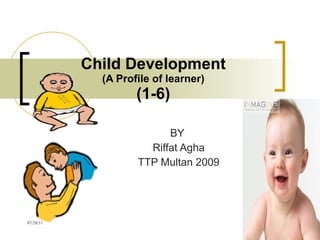Child Development Updated
- 1. Child Development (A Profile of learner) (1-6) BY Riffat Agha TTP Multan 2009
- 2. Ã˝
- 3. Ã˝
- 4. Ã˝
- 5. Child Development Religious Emotional Social Cognitive Physical Ethical
- 6. Growth??? “A series of physical, emotional, intellectual and social changes in a person from birth to maturity” (Ref: Dynamic education psy Dr-a-rauf)
- 7. Stages of Growth Early Period……………1-5 years Childhood Period ………6-12 years Adolescence Period ……13-18years Adulthood Period …….18-25 years
- 8. Development Doctor Frank says: “Development means all the changes of human being which comes in his physical, intellectual, emotional and social aspects”
- 9. Deferent between Growth and Development Growth specific for physical changes. Development changes that is continues throughout the life
- 10. Child Development: Stages of Growth 1-12 Months Recognizes Cries Starts giving response to light and movements Recognition of mother’s voice Able to grip / grasp Expression of feeling are develop Language develops Smiles and laughs Balances his posture: Sits Crawls Stands walks with support walk independently Teething period starts Grip becomes stronger. (Grips his belongings) Understanding develops Starts giving verbal response
- 11. 13 - 18 Months Starts walking Holding Touching Speaking simple words (mam, mum) Recognizes (difference b/w parents / family / and strangers) Imitates Gives response Possessive Curious / Exploring Shows emotions / expressive Comprehends (by listing to their names, voices) Demonstrates likes and dislikes Tries to eat independently
- 12. 18 months to 36 months (1 ¬Ω - 3 Years) Muscles grow stronger and movements are proper / specific Understanding of the environment and is more clear. Can follow instructions better than before Expresses himself by speaking simple sentences. Starts imitating and copying other specially adults including teachers and parents. Develops strong attitudes towards his likes and dislikes Physical energy grows stronger and stronger Grows energetic Concentration span increases Makes friends keep them for longer time. Takes pride in doing small tasks Asks questions
- 13. Psychology and Teaching Why
- 14. Physical changes of Early period Sharp Growth weight Increase as height grow Children ask many questions They are very curious / inquisitive Not understand elders’ high talk and advices/teachings They have (+/- 300) words vocabulary
- 15. Cognitive Development Cognitive development focuses on how children learn and process information . It involves language, mental imagery, thinking, reasoning, problem solving, and memory development. cognitive development is not an automatic process.
- 16. Cognitive development depends on environment They copy each and every thing of elders They don’t have cognitive sight They learn by doing Sharp memory – long lasting memory Ability of recognize and creativity
- 17. Social Development Concerning the child's identity, their relationship with others, and understanding their place within a social environment . Depend on others They want to play with others Manners of dressing and hide their body parts Limited relationships
- 18. Emotional development: Concerning children's increasing awareness and control of their feelings and how does he react to these feelings in a given situation.
- 19. Emotional Development Non consistency Emotions are not forever Emotions are unclear and abstract Emotionally Impact of inherits
- 21. Religious Development They can not understand religion as we understand
- 22. Ã˝
- 23. Ã˝
- 24. Ã˝
- 25. How we teach this level ???
- 28. Ã˝
- 29. Ã˝
- 30. Story through role play
- 31. Drama Ethical Values
- 32. Allah is greater Exploring the world
- 33. EXAMPLE OF BIRDS AND ANIMALS
- 34. Teaching by Doing……………………………. Activity Singing …. ……………...............Task Drawing…. ... ……….. ………... Story Five senses …... …................... Role play Experiences ……………………. Drama Painting…. ……………………... Visits. Questioning ……………………… Copying Cartoons…………………………. Poems
- 35. THE QUALITY OF EARLY CARE AND EDUCATION DURING THE FIRST 5 YEARS HAS LONGTERM IMPACT ON CHILDREN’S ABILITY TO SUCCEED IN SCHOOL Conclusion
- 36. So…….. Teacher should realize the importance of children's requirement
- 37. Farman Mubarak Mowlana Hazir Imam (Dubai 2008)
- 38. Thank You






































